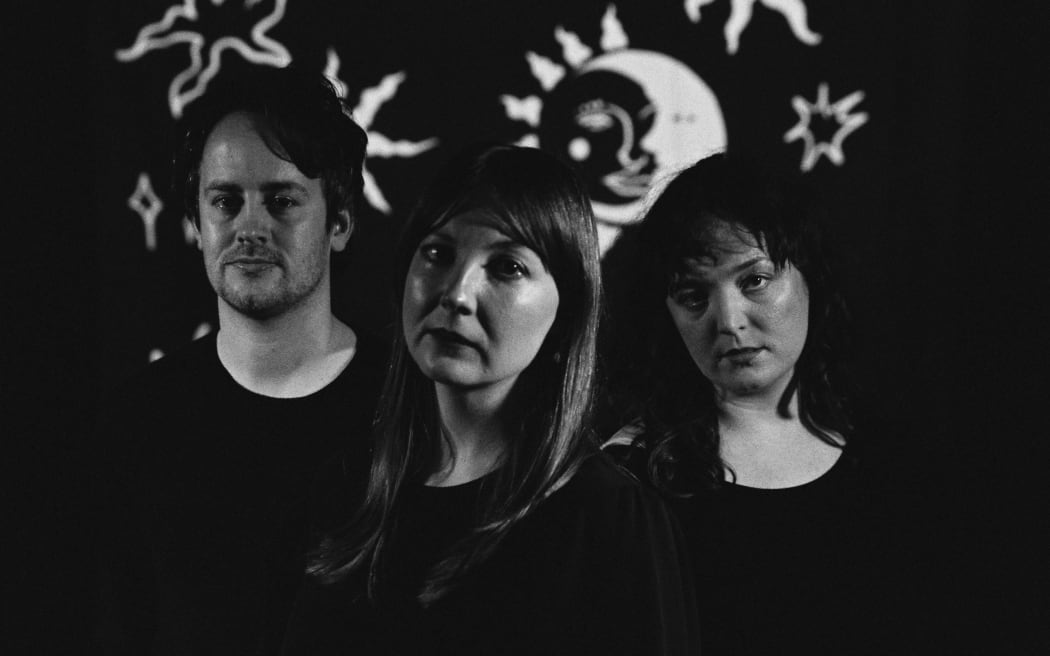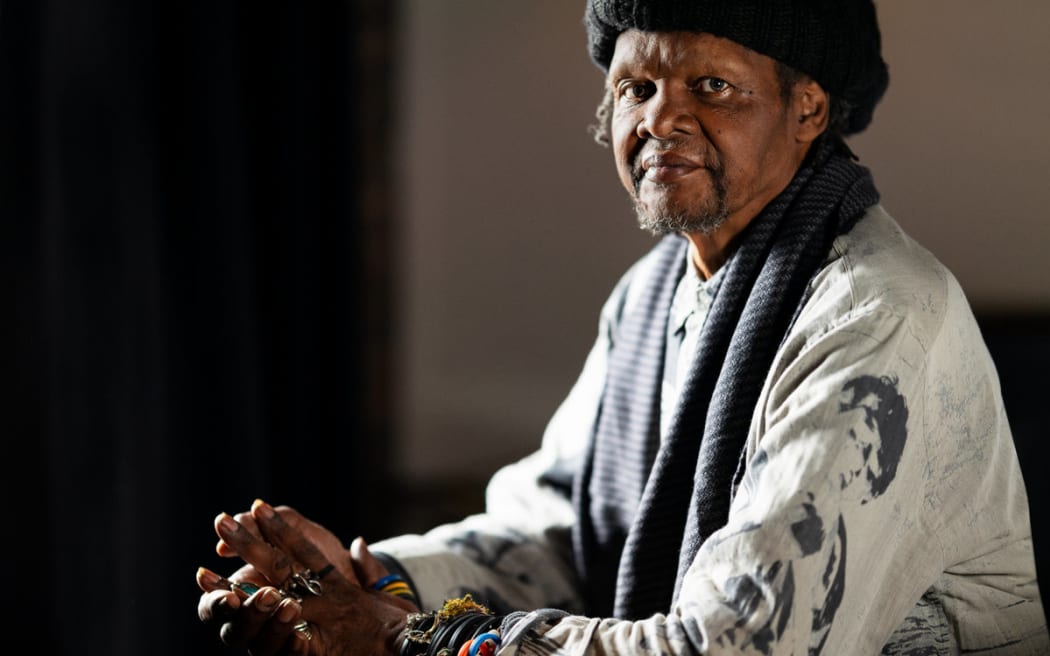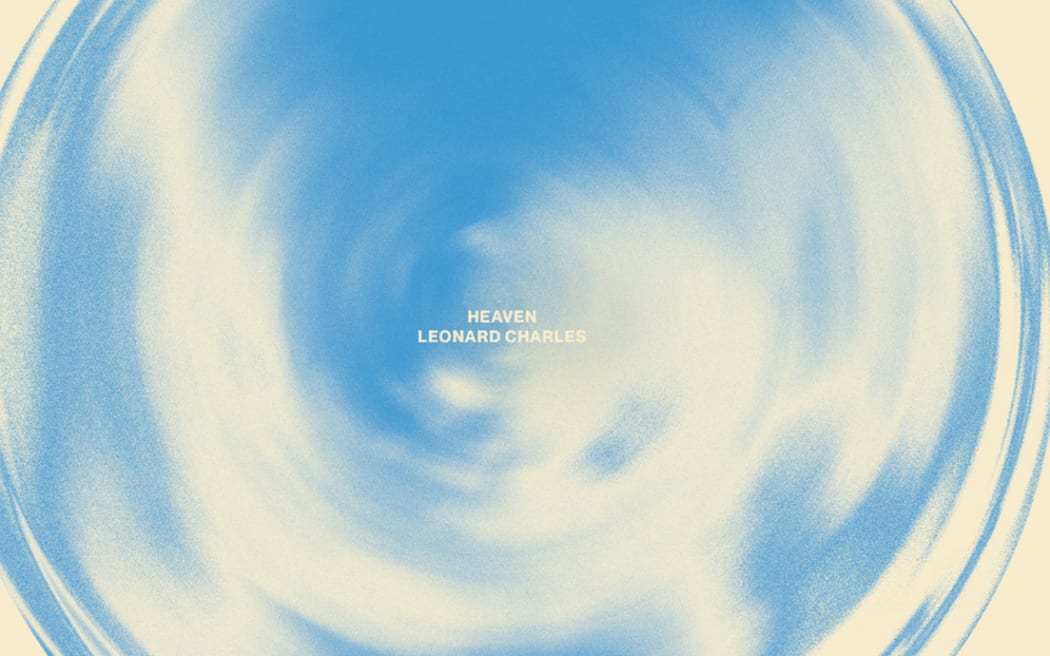Tony Stamp reviews the debut album by Te Whanganui-a-Tara trio Soft Plastics, a spiritual odyssey from 73-year-old artist Lonnie Holley, and Leonard Charles’ jubilant new EP.
Saturn Return by Soft Plastics

Photo: Lewis Ferris
Maybe this is true for every generation, but a lot of music made by people in their twenties tends to be about being in your twenties. The album Saturn Return by Te Whanganui-a-Tara band Soft Plastics embraces this head-on. It’s a record about encroaching adulthood, learning tough lessons and moving forward, framed by music that alternates between pleasantly unhinged, and precisely manicured.
Throughout Saturn Return there are references to a doomed relationship. On ‘Disembody’ Sophie Scott-Maunder sings “avoided things we should have talked about”, one of many plainspoken lyrics that could double as couples' advice. She goes on to say “I don’t know who I am”, which gets at the existential underpinnings of the album. Anyone who’s fallen out of love at a foundational point in their life will surely empathise.
I’m not sure if the songs run chronologically, but earlier ones like ‘Loozer’ seem to find Scott-Maunder trying to figure out whether to stay in a compromised partnership or move on.
That track sets up a gambling metaphor, as Scott-Maunder says “I could win some, or I could lose you”, her voice becoming distorted as the vitriol increases. It’s an album not short on snark, and she has the range to embody it alongside other emotions.
The music seems designed to capitalise on that: Laura Robinson’s drums and Jonathan Shirley’s guitar playing tend to skirt around the singer, and there’s a well-designed minimalism throughout that makes the noisier moments all the more impactful, like the late-album, shoegaze-skirting ‘Darcie’.
The album mostly sticks somewhere surf-pop adjacent, and the band acknowledge the influence of doo-wop outfits like The Ronettes. At times it comes close to The Pixies' 80s output, if a lot less screamy, and likewise they’re good at inserting an unexpected note or chord change, as befitting the spiky subject matter.
The title track comes last on Saturn Return. It’s the one that seems to find Scott-Maunder making peace with her situation, which is where the name comes into focus.
I’m not an expert on astrology, but Google tells me it’s “the time of reaching full adulthood”, which reframes the album as not just being about a breakup, but coming out the other side stronger, and possibly more mature.
It’s a knotty record, with a vocalist clearly attempting to exorcise some demons, and a band matching that with interesting musical choices. Often sweet, sometimes sour, just like adult life tends to be.
Oh Me Oh My by Lonnie Holley

Photo: Supplied
Even before you get to the music, the details of American artist Lonnie Holley’s life feel like poetry or performance. He claims to have been traded for a bottle of whiskey aged four. He became a father at fifteen and now has fifteen children. He’s been a grave digger and a cotton picker, became a visual artist in his late twenties, and later released his first album at the age of 62.
He’s now 73 and is up to album four, and the way he makes these is as unique as everything else about him - his process is entirely improvisatory, so the songs exist as records of something that will never occur again.
The beginnings of Holley’s artistic career are tinged with tragedy: two of his sister’s children died in a house fire, and he carved them tombstones from discarded sandstone. He went on to do further sculptures and moved into painting and found-object pieces.
His early life was marked by hardship - born into poverty during the Jim Crow era, and going on to spend time in the Alabama Industrial School for Negro Children, a facility that subjected kids to abuse for decades. Holley confronts his time there, and the numerous beatings he took, on the track ‘Mount Meigs’.
It’s followed with ‘Better Get That Crop in Soon’ which dramatises an exchange between an enslaved person and their enslaver, as Holley compares his trauma with that suffered by the generations before him.
In 2012, aged 62, Holley released his first album. He’d been making tapes of improvised music at home since the mid-80s, and when he played some to his friend Lance Ledbetter, founder of the record label Dust to Digital, it led to his first studio recordings.
For this album, Oh Me Oh My, Holley worked with Irish producer Jacknife Lee, who would ask him personal questions and record the results, playing keyboard as he went. Lee then edited and overdubbed instruments before Holley added a final layer of words. It’s an atypical process aimed at capturing Holley’s stream of consciousness and speaks to Lee’s skill that his contributions only bolster, and never overshadow, the vocalist - despite surrounding him with other notable names, including the distinctive tone of Michael Stipe on the title track.
Jacknife Lee had noted people who said they were fans of Holley’s and invited them to appear on the album. Some of those seem slightly unlikely, like Bon Iver and Sharon Van Etten, but like Stipe, they’re mostly subsumed into the texture of the record.
One name that makes perfect sense is poet and activist Moor Mother, who appears on two tracks, including the brassy, buoyant, ‘I Am Part of the Wonder’.
Tracks like that get at a recurring theme running through Oh Me, Oh My - a record of a man in the last act of his life, pondering his place in the world, and shrugging off any hardship he may have faced in favour of spiritual acceptance.
There’s a balance set between his style, which doesn’t obey many of the rules that traditional musicians tend to follow, and a certain amount of studio polish.
Interviews with Lonnie Holley note that he’s always creating - sketching on napkins or knocking on objects to see what sound they make, and his music is an extension of that. He carries inside him a fount of poetry that seemingly can be tapped into at will, but never repeated. If you ever see him perform live, you’ll see something created on the spot.
In a recent interview with the New York Times, Jacknife Lee said “He does with his art what he did with his life: He takes difficult, awful experiences and makes them beautiful.”
Heaven by Leonard Charles

Photo: Supplied
In 2018 The Spinoff wrote “Jeremy Toy’s impact on local music should not be understated”, in an article that details two serious injuries he suffered within five years: while unloading gear from the back of a ute, he was hit by a motor scooter, which left him with two broken legs, unable to walk for several months. A surgeon told him he was lucky to be alive.
Five years earlier, he’d been king hit on Ponsonby Road, causing a severe brain injury. Symptoms of concussion haunted him for years after the fact.
Given this run of bad luck, it’s striking that the music Toy makes is as free of angst as it’s ever been. As well as other projects he regularly outputs tunes under his pseudonym Leonard Charles, and his latest release, the appropriately-named Heaven EP, features some of his most jubilant material.
Near the start of the 2000s Toy was in the much-loved outfit Opensouls, then went on to form the shoegaze band She’s So Rad. He’s performed with and produced artists like Hollie Smith, Mel Parsons, and Liam Finn, and provided the soundtrack to the film The Breaker Upperers. That’s just a fraction of his output.
In 2020 he released a collaborative album with Detroit rapper Guilty Simpson, who appears here on the track 'Shining Bright’.
When I interviewed the pair about their record LSD, Simpson raved about Toy’s musicality, stressing how impressed he was with that compared to other producers who had pitched him beats.
If you’ve looked at the Leonard Charles Instagram account over the past few years, you could have seen him play drums, bass, guitar, keys, sampler, the Bansuri flute or the Mohan veena, used in Indian classical music. He’s someone whose practice is part of the process, and this EP is further proof of his versatility, pivoting as it does to disco and boogie music.
‘Nine Lives’ features Leroy Burgess, the 69-year-old singer who fronted the Harlem R&B group Black Ivory in the 70s, and was referred to by UK DJ Ashley Beedle as “the godfather of disco boogie” in the liner notes to his 2001 Anthology.
His presence here shows how well-regarded Jeremy Toy is among certain international circles, and it’s notable that another three of the five guest vocalists also hail from outside Aotearoa.
The exception is Alex Freer, who plays drums in Tiny Ruins and makes synth-pop under the name A.C. Freazy. He fits in perfectly on the track ‘Change’, dispensing wisdom amongst music that’s as effervescent and uplifting as everything else on the Heaven EP.

